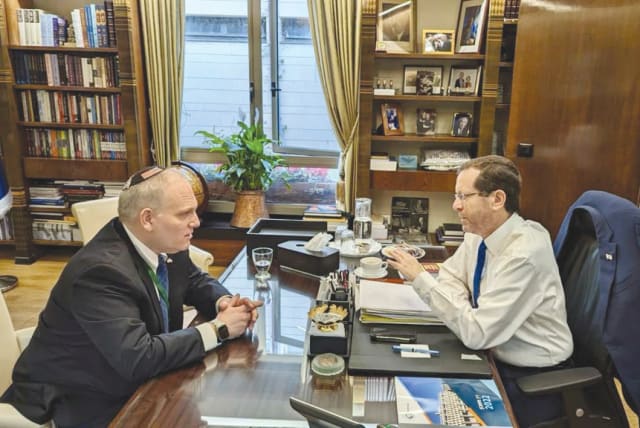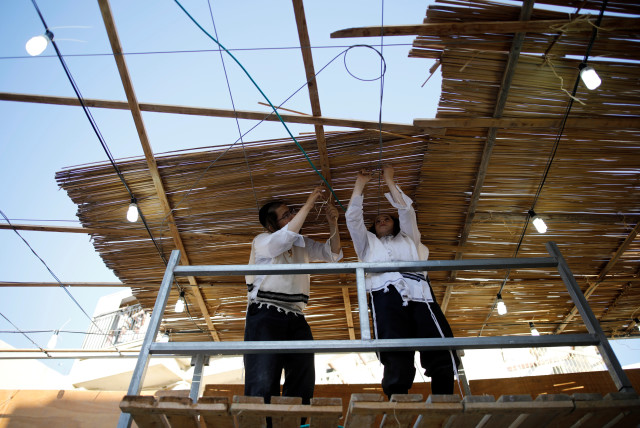In complicated times, Sukkot brings out the best in us - opinion

The holiday reminds us that rain or shine, we are all in this together.
Sukkot, sometimes neglected in the Diaspora as it comes on the heels of the High Holy Days, ranks as one of my favorite Jewish holidays. The eight-day festival is, no doubt, the most whimsical celebration in our tradition – as we build outdoor booths in which we eat, pray, congregate, and maybe even sleep. This practice, along with our traditional Four Species ceremony with the etrog (citron), lulav (palm frond), hadas (myrtle branch), and arava (willow branch), recalls the agricultural heritage of the ancient Israelites. Scholars agree that this festival, also known as the Feast of Tabernacles, was first instituted to commemorate the fall harvest.
Few are the modern Jews who till the soil or bring in the harvest, but the holiday stands as a wonderful reminder of our relationship to the earth and the bounty it provides. Jewish environmentalists often highlight the occasion to raise eco-awareness and urge us to be responsible stewards of the earth. The ecological challenge is not the only contemporary concern evoked by Sukkot. In this time of discord – as the political debate continues to roil Israel and in the United States, partisanship remains at a fever pitch – the sukkah also serves as an emblem of unity and peace.
Entire communities construct the sukkah together and live, worship, and eat in the makeshift structure over the eight days. The booth can sometimes feel like a claustrophobic space when an entire congregation must avail itself of this often reduced area and the usual seating arrangements of the synagogue pews and at the Kiddush table can become disorganized. I remember many times when, as a result of this upset in the order of things, I wound up interacting with someone in my community that I had not previously met. In this way, Sukkot promotes and expands communal bonding.
The sukkah represents unity, shared destiny
In a period when we tend to avoid and ignore those who differ from us in their political, cultural, and social commitments, Sukkot and the sukkah underscore the central themes of unity and shared destiny. Encountering those whom we may not know – and those with whom we disagree – helps us overcome tensions in our community and reconcile with each other. Thus, we advance down the road to mutual understanding and harmony.
The sukkah also embodies the shared destiny of the Jewish people. It is famously constructed so that the roof is somewhat open, allowing in both rain and sun. Just as we all experience both good and inclement weather, so too must our community pass through the inevitable easy-and-difficult times as one.
Today, the Jewish community faces a host of menaces, from resurgent global antisemitism to the prospect of a nuclear Iran, to the ongoing bid to delegitimize the State of Israel. But no matter the rain that sometimes comes into our lives nor the existential threats that confront us, we will pray, “ufros aleinu sukkat shelomecha,” “spread over us the shelter of Your peace,” and we will confront these matters together.
Meanwhile, the Conference of Presidents of Major American Jewish Organizations champions the ideas that animate our community during Sukkot and every day through dialogue and discussion, peace and harmony, and unity – come fair or foul weather. The 50 organizations that make up our membership talk across differences, work together to serve our community’s interests, and never leave the metaphorical sukkah.
The writer is CEO of the Conference of Presidents of Major American Jewish Organizations, the senior professional guiding the Conference’s agenda on behalf of its 50 national member organizations, which represent the wide mosaic of American Jewish life. Follow him at @Daroff.
Jerusalem Post Store
`; document.getElementById("linkPremium").innerHTML = cont; var divWithLink = document.getElementById("premium-link"); if (divWithLink !== null && divWithLink !== 'undefined') { divWithLink.style.border = "solid 1px #cb0f3e"; divWithLink.style.textAlign = "center"; divWithLink.style.marginBottom = "15px"; divWithLink.style.marginTop = "15px"; divWithLink.style.width = "100%"; divWithLink.style.backgroundColor = "#122952"; divWithLink.style.color = "#ffffff"; divWithLink.style.lineHeight = "1.5"; } } (function (v, i) { });

